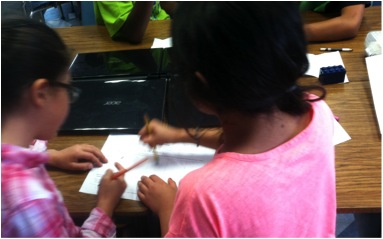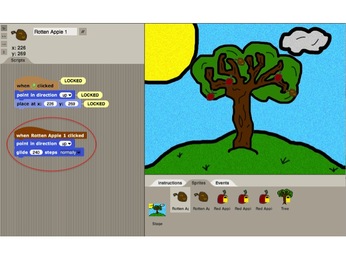How is KELP-CS being developed?
|
KELP-CS is being developed through design-based research methods. We observe how well children understand the activities, what they learn (and did not learn), and we talk to their teachers. We use this information to immediately make changes to the curriculum to ensure that our curriculum is effective for our target age group. We have pilot tested and gone through multiple iterations of Module 1 during the 2013-14 school. We are now pilot testing Module 2.
In addition to the research that directly informs our curriculum, we are trying to understand how children learn computer programming, and more generally, computational thinking. What we learn from this study will inform other curricula for elementary school children across the nation. |
Publications[3] Franklin, D., Harlow, D., Dwyer, H., Henkens, J., Hill, C., Iveland, A., Killian, A., & Development Staff. (2014). Kids Enjoying Learning Programing (KELP-CS) – Module 1 Digital Storytelling. A computer science curriculum for elementary school students. Available at https://discover.cs.ucsb.edu/kelpcs/educators
[2] Dwyer, H., Hill, C., Carpenter, S., Harlow, D., & Franklin, D. (2014). Identifying elementary students’ pre-instructional ability to develop algorithms and step-by-step instructions. In Proceedings of the 45th Technical Symposium on Computer Science Education (SIGCSE ’14). Atlanta, GA: ACM. [1] Dwyer, H., Boe, B., Hill, C., Franklin, D., & Harlow, D. (2014). Computational thinking for physics: programming models of physics phenomenon in elementary school. In Proceedings of the 2013 Physics Education Research Conference (PERC ’13). Melville, NY: AIP Conference Proceedings. |
Presentations[6] Franklin, D. (2014, October). KELP CS: 4 - 6 grade design-based computational thinking curriculum, Presentation at the fall meeting of the Computer-Using Educators Conference (CUE), Napa Valley, CA.
[5] Hill, C., Harlow, D., & Franklin, D. (2014, April). La Playa: A programming environment for elementary school classes. Presentation at the Celebration of Women in Computing in Southern California (SoCal_CWIC), Carlsbad, CA. [4] Franklin, D., Dwyer, H. A., Hill, C., & Iveland, A. (2014, April). Coding with Scratch and Octopi. Professional development workshop for teachers in the Ventura County Science Technology Engineering, Arts, and Mathematics Network (VC-STEM-N), Ventura, CA. [3] Dwyer, H., Hill, C., Carpenter, S., Harlow, D., Franklin, D. (2014, March). Identifying elementary students’ pre-instructional ability to develop algorithms and step-by-step instructions. Paper presented at the 45th ACM Technical Symposium on Computer Science Education (SIGCSE), Atlanta, GA. [2] Franklin, D., & Dwyer, H. (2014, January). Computer science (CS) in elementary schools. Roundtable discussion at the National Science Foundation STEM-C Partnerships (CE21) Principal Investigator and Community Meeting, Orlando, FL. [1] Dwyer, H. A., Boe, B., Hill, C., Franklin, D., & Harlow, D. (2013, July). Computational thinking for physics: Programming models of physics phenomenon in elementary school. Poster presented at the Physics Education Research Conference (PERC), Portland, OR. |


